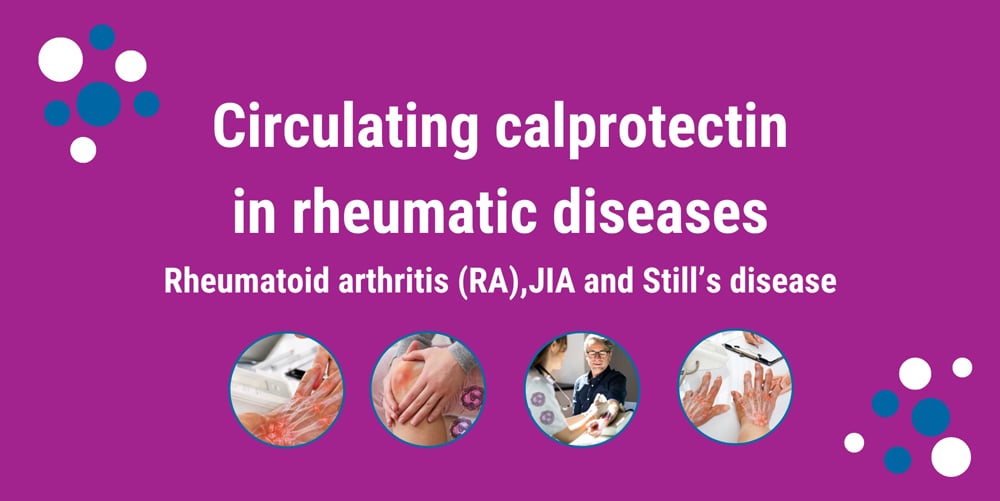
Calprotectin is an acute-phase protein (heterodimer of S100A8 and S100A9) highly expressed by monocytes and neutrophils. During inflammation, neutrophils migrate to the inflammatory site and secrete large amounts of calprotectin acting as a soluble proinflammatory mediator. Locally released calprotectin enters the systemic circulation where it can be measured in serum and plasma, directly reflecting joint inflammatory activity.1-3
The value of calprotectin in chronic inflammatory conditions
Calprotectin in serum and plasma has been described as valuable biomarker in several chronic inflammatory conditions, including multiple rheumatic conditions. It has been reported to correlate with and partly outperform clinical disease activity scores, ultrasound and other inflammatory biomarkers.
Calprotectin’s biomarker potential is reported in diagnosis and differentiation, prediction of treatment response and flares, as well as treatment monitoring.1-4 Therefore, incorporating calprotectin testing into clinical practice could significantly enhance the management of these diseases, by allowing for sensitive detection of disease activity, more accurate evaluation of treatment response, and timely identification of disease relapse.

Disease activity and relapse in rheumatoid arthritis (RA)
Since the concentration of circulating calprotectin reflects the degree of inflammation in rheumatoid arthritis (RA), it can provide valuable assessment of disease activity, treatment response and relapse. Calprotectin has been proven to be a very sensitive biomarker, allowing detection of even low disease activity distinguishing it from remission.5,6 This is in contrast to C-reactive protein (CRP) and erythrocyte sedimentation rate (ESR), which are low in 40% of patients despite active disease.5-7 Moreover, RA patients are often treated with a wide range of medications, some of which indirectly lower downstream levels of CRP. Calprotectin can therefore be a useful biomarker when CRP is normal or difficult to interpret, such as in patients treated with therapies that suppress interleukin-6 (IL-6) or tumour necrosis factor (TNF).8-11 In addition to direct treatment monitoring, calprotectin can also independently predict disease relapse guiding patient monitoring and treatment decisions.12
Guidance of treatment in JIA and Still’s disease
In care for Juvenile Idiopathic Arthritis (JIA) patients, calprotectin has proven great value in prediction of remission, flares and treatment response. Before treatment, high levels of calprotectin can indicate a positive treatment response13-15, whereas low calprotectin levels can guide safe withdrawal of treatment.15-17 Additionally, during monitoring of patients in remission, calprotectin can provide an early indication of relapse.18
Systemic autoinflammatory diseases
In the case of Still's disease (systemic JIA and Adult onset Still’s disease (AOSD)), calprotectin has been described in diagnosis, predicting relapse, and evaluating disease activity.19 Especially the differentiation of Still's disease with other inflammatory conditions is challenging, where calprotectin allows the critical early differentiation. Furthermore, calprotectin levels can be used as a predictive biomarker for relapse and correlate with treatment response guiding disease management.20-22
Calprotectin now recommended for diagnosing Still's disease by European rheumatology organisations
The European Alliance of Associations for Rheumatology (EULAR) and the Paediatric Rheumatology European Society (PReS) have recognised calprotectin as a valuable biomarker in the diagnosis of Still’s disease. This recommendation highlights the growing importance of calprotectin in improving diagnostic accuracy for inflammatory conditions.
Study shows calprotectin's high accuracy in diagnosing Still’s disease in paediatric patients
Diagnosis of Still’s disease is challenging in patient presenting with fever of unknown origin and differentiation from other causes are crucial for diagnosis. A recent cohort study, including 1110 paediatric patients, reported elevated calprotectin in Still’s patients compared with other diagnoses (including infections and autoinflammatory diseases), showing highest accuracy compared to other markers like ferritin, procalcitonin and IL-18.23
Read the updated EULAR/PReS recommendations here.

GCAL® - Plasma and serum calprotectin*
GCAL® for measurement of calprotectin in plasma and serum in the assessment of inflammation and inflammatory response to infection. The GCAL® assay is a novel Particle-Enhanced Turbidimetric Immunoassay (PETIA) that can be applied on a wide range of automated clinical chemistry analysers.
The GCAL® immunoassay is developed and manufactured by Gentian. GCAL® is CE-marked and IVDR certified.
Get in touch for more information about GCAL®
Interested in plasma and serum calprotectin? Want to know more? Please send an email to marketing@gentian.com or fill out the form below:
References
- Ometto F et al. Calprotectin in rheumatic diseases. Exp Biol Med (Maywood), 2017
- Pruenster M et al. S100A8/A9: From basic science to clinical application. Pharmacol Ther, 2016
- Wang Q et al. The Role of Calprotectin in Rheumatoid Arthritis. J Transl Int Med, 2019
- Romand X et al. Systemic calprotectin and chronic inflammatory rheumatic diseases. Joint Bone Spine, 2019
- Wang Y et al. Clinical significance of serum calprotectin level for the disease activity in active rheumatoid arthritis with normal C-reactive protein. Int J Clin Exp Pathol, 2019
- Hurnakova J et al. Serum calprotectin may reflect inflammatory activity in patients with active rheumatoid arthritis despite normal to low C-reactive protein. Clin Rheumatol, 2018
- Pincus T et al. Laboratory tests to assess patients with rheumatoid arthritis: advantages and limitations. Rheum Dis Clin North Am, 2009
- Andrés Cerezo L et al. Decreases in serum levels of S100A8/9 (calprotectin) correlate with improvements in total swollen joint count in patients with recent-onset rheumatoid arthritis. Arthritis research & therapy, 2011
- Inciarte-Mundo J et al. Calprotectin and TNF trough serum levels identify power Doppler ultrasound synovitis in rheumatoid arthritis and psoriatic arthritis patients in remission or with low disease activity. Arthritis Res Ther, 2016
- Hammer HB et al. The soluble biomarker calprotectin (an S100 protein) is associated to ultrasonographic synovitis scores and is sensitive to change in patients with rheumatoid arthritis treated with adalimumab. Arthritis Res Ther, 2011
- Jarlborg M et al. Serum calprotectin: a promising biomarker in rheumatoid arthritis and axial spondyloarthritis. Arthritis research & therapy, 2020
- Inciarte-Mundo J et al. Calprotectin strongly and independently predicts relapse in rheumatoid arthritis and polyarticular psoriatic arthritis patients treated with tumor necrosis factor inhibitors: a 1-year prospective cohort study. Arthritis research & therapy, 2018
- Moncrieffe H et al. A subgroup of juvenile idiopathic arthritis patients who respond well to methotrexate are identified by the serum biomarker MRP8/14 protein. Rheumatology (Oxford), 2013
- Alberdi-Saugstrup M et al. Low pretreatment levels of myeloid-related protein-8/14 and C-reactive protein predict poor adherence to treatment with tumor necrosis factor inhibitors in juvenile idiopathic arthritis. Clin Rheumatol, 2017
- Anink J et al. MRP8/14 serum levels as a predictor of response to starting and stopping anti-TNF treatment in juvenile idiopathic arthritis. Arthritis Res Ther, 2015
- Foell D et al. Methotrexate treatment in juvenile idiopathic arthritis: when is the right time to stop? Ann Rheum Dis, 2004
- Sumner EJ et al. Use of MRP8/14 in clinical practice as a predictor of outcome after methotrexate withdrawal in patients with juvenile idiopathic arthritis. Clin Rheumatol, 2022
- Schulze zur Wiesch A et al. Myeloid related proteins MRP8/MRP14 may predict disease flares in juvenile idiopathic arthritis. Clin Exp Rheumatol, 2004
- Jung JY et al. Roles of Interactions Between Toll-Like Receptors and Their Endogenous Ligands in the Pathogenesis of Systemic Juvenile Idiopathic Arthritis and Adult-Onset Still's Disease. Front Immunol, 2020
- Frosch M et al. Myeloid-related proteins 8 and 14 are specifically secreted during interaction of phagocytes and activated endothelium and are useful markers for monitoring disease activity in pauciarticular-onset juvenile rheumatoid arthritis. Arthritis Rheum, 2000
- Aljaberi N et al. The use of S100 proteins testing in juvenile idiopathic arthritis and autoinflammatory diseases in a pediatric clinical setting: a retrospective analysis. Pediatr Rheumatol Online J, 2020
- Guo Q et al. Serum calprotectin--a promising diagnostic marker for adult-onset Still's disease. Clin Rheumatol, 2016
- Park C et al. MRP8/14 serum levels as diagnostic markers for systemic juvenile idiopathic arthritis in children with prolonged fever. Rheumatology (Oxford), 2021
* The assay might not be registered for use in your country of residence and may not comply with applicable laws or regulations in that country. The assay is not cleared for use in the USA (RUO only).


-1.jpg)
.png)